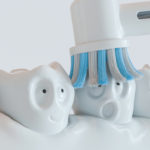
Clean teeth are healthy teeth.
“Ever since the first dental school was founded in the United States in 1840, dentistry and medicine have been taught as — and viewed as — two separate professions. That artificial division is bad for the public’s health. It’s time to bring the mouth back into the body.” This wisdom from Bruce Donoff, D.M.D. and M.D, and dean of Harvard School of Dental Medicine, is becoming more commonplace as doctors and dentists are realizing the connections between oral health and physical health.
Periodontal disease, commonly called gum disease, has long-lasting effects on the body. It has been linked to diabetes, cardiovascular disease and high blood pressure. For pregnant women, gum disease can cause pre-eclampsia, causing complications and often resulting in low birth weight of babies. In order for dentists and doctors to increase their learning on how all health is related, many dental schools have started to incorporate medical training for their dental students. Working from this perspective of shared knowledge can only benefit patients.
How to Keep Your Teeth Healthy
-Brush teeth twice a day
-Use proper equipment—toothpaste with fluoride and electric toothbrush. Electric toothbrushes are very effective, especially for arthritis sufferers or other people with mobility issues.
-Hold your toothbrush correctly, at an angle so the bristles align with the area of your tooth that meets the gum. Be sure to brush the outside of your teeth, the inside and all chewing surfaces.
-Store your toothbrush, upright so it can air dry. Try to keep each toothbrush away from other toothbrushes to avoid cross contamination if one member of the family is sick.
-Replace your toothbrush every 3-4 months or when the bristles look worn.
-Flossing is an essential part of oral hygiene. Floss can go under the gum-line and between teeth, where toothbrushes cannot reach.
-Use a mouth rinse
-Avoid toothpicks which could injure gums and introduce bacteria under the gums
Some people are concerned about the presence of fluoride in water and in toothpaste. It has been linked to cancers, increased risk of bone fractures and damage to the brain and central nervous system. For people who are trying to avoid fluoride, most experts recommend adding a filter to your water line that will remove fluoride from your water. An alkaline water system can remove fluoride in water, www.wellnessbalancellc.yourbodyiswater.info. The fluoride found in toothpaste is a relatively small amount and is not ingested like the fluoride in water. If you prefer to clean your teeth without fluoride, you can use Coconut Oil for its antibacterial properties—try oil pulling to reduce bacteria in your mouth.
For keeping your mouth healthy and free from toothaches or sores, try diluting Oregano oil with coconut oil and rinsing the affected areas. Do not swallow the oil, but spit it out in a trash can, not down your sink, which can clog the drain over time.
Taking care of your teeth and gums is one way to ensure good health for a lifetime.





